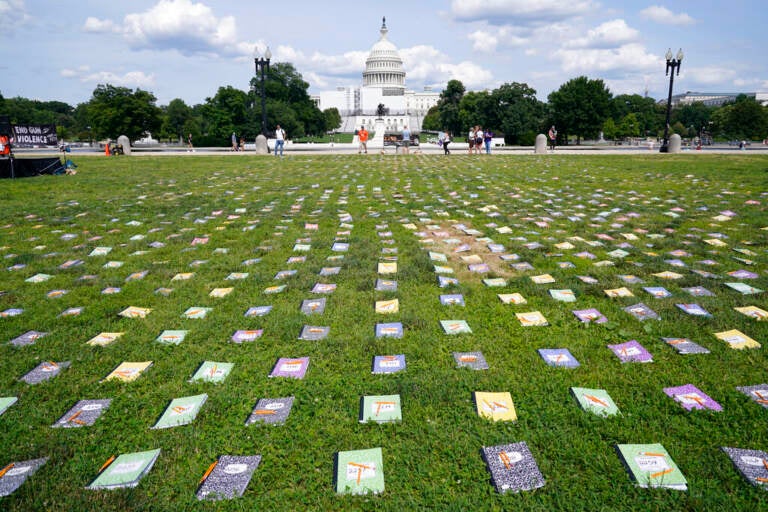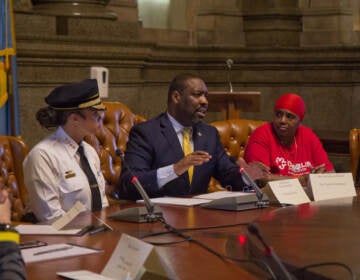Senate bargainers announce outline of gun violence agreement
Senate bargainers have announced a bipartisan framework responding to last month’s mass shootings in New York and Texas.

Laid out near the U.S. Capitol are 2,280 schoolbooks and broken pencils that represent the 2,280 children that have been killed by gun violence since the Senate has refused to bring a vote on background checks, during a rally in Washington, Friday, June 10, 2022. (AP Photo/Susan Walsh)
Senate bargainers announced a bipartisan framework Sunday responding to last month’s mass shootings, a modest breakthrough offering measured gun curbs and bolstered efforts to improve school safety and mental health programs.
The proposal falls far short of tougher steps long sought by President Joe Biden and many Democrats. Even so, if the accord leads to the enactment of legislation, it would signal a turnabout from years of gun massacres that have yielded little but stalemate in Congress.
Leaders hope to push any agreement into law quickly — they hope this month — before the political momentum fades that has been stirred by the recent mass shootings in Buffalo, New York, and Uvalde, Texas.
In a significant development, 20 senators, including 10 Republicans, released a statement calling for passage. That is potentially crucial because the biggest obstacle to enacting the measure is probably in the 50-50 Senate, where at least 10 GOP votes will be needed to attain the usual 60-vote threshold for approval.
“Families are scared, and it is our duty to come together and get something done that will help restore their sense of safety and security in their communities,” the lawmakers said.
The compromise would make the juvenile records of gun buyers under age 21 available when they undergo background checks. The suspects who killed 10 people at a grocery store in Buffalo and 19 students and two teachers at an elementary school in Uvalde were both 18, and many of the attackers who have committed mass shootings in recent years have been young.
The agreement would offer money to states to implement “red flag” laws that make it easier to temporarily take guns from people considered potentially violent, and to bolster school safety and mental health programs.
More people who sell guns would be required to obtain federal dealers’ licenses, which means they would have to conduct background checks of purchasers. Domestic abusers who do not live with a former partner, such as ex-boyfriends, would be barred from buying firearms, and it would be a crime for a person to legally purchase a weapon for someone who would not qualify for ownership.
Negotiators said details and legislative language would be written over the coming days. Congressional aides said billions of dollars would be spent expanding the number of community mental health centers and suicide prevention programs, but that other spending figures remained undecided.
Finalizing the agreement might produce fresh disputes and it was unclear how long that would take. But the parties’ shared desire to demonstrate a response to the recent shootings suggested momentum toward enactment was strong.
Biden said in a statement that the framework “does not do everything that I think is needed, but it reflects important steps in the right direction, and would be the most significant gun safety legislation to pass Congress in decades.”
Given the bipartisan support, “there are no excuses for delay, and no reason why it should not quickly move through the Senate and the House,” he said.
The announcement underscored the election-year pressure both parties have felt since 10 Black people were killed at a grocery store in Buffalo and 19 students and two teachers were killed at an elementary school in Uvalde. And it came a day after rallies were held around the country calling for gun curbs — with the gathering on Washington’s National Mall attracting around 30,000 people.
Those massacres prompted two weeks of closed door talks among groups of senators led by Sens. Chris Murphy, D-Conn., John Cornyn, R-Texas, Thom Tillis, R-N.C., and Krysten Sinema, D-Ariz.
Still, the agreement represents a lowest common denominator compromise on gun violence, not a complete sea change in Congress. Lawmakers have demonstrated a newfound desire to move ahead after saying their constituents have shown a heightened desire for congressional action since Buffalo and Uvalde, but Republicans still oppose more sweeping steps that Democrats want.
These include banning assault-style firearms such as the AR-15 style rifles used in Buffalo and Uvalde, or raising the legal age for buying them. AR-15s are popular and powerful semi-automatic weapons that can fire high-capacity magazines and have been used in many of the nation’s highest-profile slaughters in recent years. One of them, the killing of 49 people at the Pulse nightclub in Orlando, Florida, occurred six years ago Sunday.
Democrats have also wanted to ban high capacity magazines and to expand required background checks to far more gun purchases. None of those proposals has a chance in Congress.
Underscoring that, the Democratic-controlled House approved sweeping bills this past week barring sales of semiautomatic weapons to people under age 21 and large-capacity magazines, and giving federal courts the power to rule when local authorities want to remove guns from people considered dangerous. Currently, only 19 states and the District of Columbia have red-flag laws.
For years, congressional Republicans representing rural, pro-gun voters have blocked robust restrictions on firearms purchases, citing the Constitution’s Second Amendment. Democrats, whose voters overwhelmingly favor gun restrictions, have been reluctant to approve incremental steps that they have thought would let GOP lawmakers argue they have tried stemming the tide of violence without meaningfully addressing the problem.
WHYY is your source for fact-based, in-depth journalism and information. As a nonprofit organization, we rely on financial support from readers like you. Please give today.





